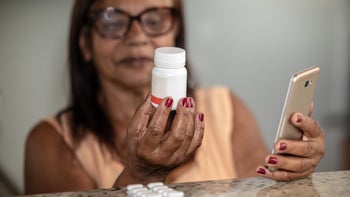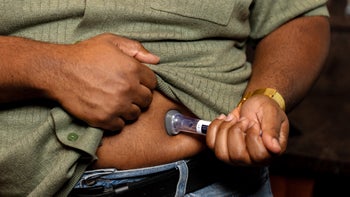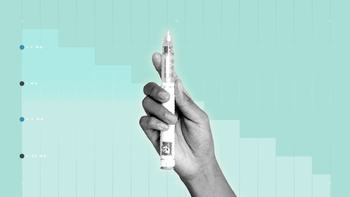
Rybelsus (Oral Semaglutide) for Weight Loss: 4 Things You Should Know
Key takeaways:
Rybelsus (semaglutide) is an oral medication FDA approved to treat Type 2 diabetes. It contains the same active ingredient as the injections Ozempic (for Type 2 diabetes) and Wegovy (for weight loss).
Higher doses of Rybelsus (25 mg and 50 mg) have been studied for weight loss. Clinical trial results show that the 25 mg dose leads to weight loss similar to Wegovy.
The manufacturer plans to request FDA approval for oral semaglutide for weight loss within the next few months, with an expected launch in 2026.
Table of contents

For decades, researchers have been looking for an effective weight-loss pill. But the recent success of glucagon-like peptide-1 (GLP-1) weight-loss injections has sparked new hope — especially for those frustrated with existing oral options.
But for many, injections aren’t the most convenient or preferred choice. The possibility of achieving similar weight-loss results with a daily pill is appealing — and it may soon become a reality.
Semaglutide first entered the market as Ozempic, an injection for Type 2 diabetes. This was followed by Rybelsus, the first GLP-1 diabetes medication in pill form. Later, higher Ozempic doses were approved specifically for weight loss as Wegovy. Now, Rybelsus is following a similar path, with higher doses shown to help people lose weight.
Here’s what you should know about Rybelsus for weight loss — from study results to its potential approval timeline.
1. Rybelsus is approved for diabetes, but it’s being studied for weight loss
Both Rybelsus and Ozempic are FDA approved for Type 2 diabetes, while Wegovy is approved for weight loss. Because Ozempic was found to cause significant weight loss, its higher doses were studied and later approved as Wegovy. Rybelsus is now undergoing similar research.
Currently, Rybelsus is available in 3 mg, 7 mg, and 14 mg tablets for Type 2 diabetes. A second formulation comes in 1.5 mg, 4 mg, and 9 mg doses. However, higher oral semaglutide doses (25 mg and 50 mg) have been studied specifically for weight loss in adults without diabetes who have:
A body mass index (BMI) of 30 or higher
A BMI of 27 or higher with at least one weight-related health condition, such as high blood pressure
Picking needle-free options: In addition to weight-loss injections, several oral medications can also help you lose weight. Experts review which weight-loss pills actually work.
Knowing the risks: Compounded products can help people access certain medications. But before giving compounded semaglutide a try, it’s a good idea to understand the potential risks.
How they compare: Rybelsus and Wegovy both contain semaglutide, but they aren’t exactly the same. Here’s how Rybelsus and Wegovy compare.
Clinical trial results have shown that these higher doses can lead to significant weight loss, similar to Wegovy. Given these promising results, the manufacturer expects to apply for FDA approval for weight loss within the next few months. If everything goes as planned, oral semaglutide for weight loss could launch in 2026.
2. Higher Rybelsus doses for weight loss show results comparable to Wegovy
So, how does Rybelsus stack up against Wegovy? The two medications haven’t been directly compared in clinical trials for weight loss, but individual studies may give us some idea.
The OASIS 1 and OASIS 4 clinical trials tracked weight loss in adults taking oral semaglutide 50 mg and 25 mg, respectively. During OASIS 1, people taking the 50 mg dose lost about 15% of their starting body weight at 68 weeks (about 16 months). The OASIS 4 trial showed almost 14% weight loss at 64 weeks (about 15 months) with the 25 mg dose.
This is comparable to the results from the largest Wegovy trial — about 15% average weight loss with the highest dose (2.4 mg) within a similar timeframe. But it’s important to note that a 7.2 mg Wegovy dose is being studied, with results showing nearly 21% weight loss.
3. Higher Rybelsus doses are also being studied for Type 2 diabetes, with greater blood glucose and weight-loss benefits
Higher Rybelsus doses have also been studied for Type 2 diabetes in the Pioneer Plus trial. If approved, Rybelsus could be available in higher doses than what’s currently available.
Similar to the weight-loss trials, the 25 mg and 50 mg doses in people with Type 2 diabetes resulted in greater weight loss compared to the 14 mg dose. The 50 mg dose resulted in a little over twice as much weight loss as the 14 mg dose.
Additionally, higher Rybelsus doses led to greater reductions in hemoglobin A1C (average blood glucose over 3 months). Given these findings, the manufacturer had planned to request FDA approval for the 25 mg and 50 mg doses for Type 2 diabetes in 2023. But it’s not clear if the application has been submitted yet.
4. Rybelsus isn’t the only oral GLP-1 medication being studied for weight loss, but it may be the furthest along
In addition to Rybelsus, other oral GLP-1 medications are being studied for weight loss. But, they aren’t as far along in research and development. Even so, the results also look promising. A few examples include:
Orforglipron: A once-daily oral GLP-1 medication in phase 3 trials, with results expected in 2025. Earlier clinical trial results show average weight loss up to about 15% of starting body weight after 36 weeks (8 months) in people taking it. Orforglipron is also being studied for Type 2 diabetes and obstructive sleep apnea.
Danuglipron: An oral GLP-1 medication in phase 2 trials for weight loss and Type 2 diabetes. Initial results from the weight-loss trial showed up to about 12% weight loss after 32 weeks (7 months) with a twice-daily dosage. However, the manufacturer plans to move forward with a once-daily modified-release formulation.
Currently, all FDA-approved GLP-1 medications, including semaglutide, are peptides — larger molecules made of amino acids. This is why they end with “tide." Orforglipron and danuglipron are smaller, chemical-based drugs. This is why they end with “glipron” instead. Both types work in a similar way, but their molecular structures are different. Chemical-based drugs are also easier and cheaper to make, generally speaking.
The bottom line
Rybelsus is an oral version of semaglutide that’s approved to treat Type 2 diabetes. Higher Rybelsus doses than what’s currently FDA approved are being studied for weight loss. They’re also being studied for Type 2 diabetes, which would provide additional dose options for people with the condition.
Study results have shown that higher Rybelsus doses result in weight loss that’s comparable to Wegovy, a higher-dose injectable version of semaglutide for weight loss. They also result in greater weight loss and hemoglobin A1C reduction in people with diabetes than lower Rybelsus doses.
Rybelsus’ manufacturer plans to request FDA approval for weight loss in 2025, with a potential launch in 2026. The timeline for higher doses for diabetes hasn’t been confirmed.
Why trust our experts?


References
Buzby, S. (2024). Daily oral semaglutide confers weight loss vs. placebo; similar vs. weekly injectables. Endocrine Today.
ClinicalTrials.gov. Research study looking at how well semaglutide tablets taken once daily work in people who have a body weight above the healthy range (OASIS 4). National Library of Medicine.
ClinicalTrials.gov. (2024). A study to evaluate the efficacy and safety of PF-06882961 in adults with obesity. National Library of Medicine.
ClinicalTrials.gov. (2025). A study of orforglipron in adult participants with obesity or overweight and type 2 diabetes (ATTAIN-2). National Library of Medicine.
ClinicalTrials.gov. (2023). Research study to investigate how well semaglutide tablets taken once daily work in people who are overweight or living with obesity (OASIS 1) (OASIS 1). National Library of Medicine.
Eli Lilly and Company. (2025). Medicines in development.
Gilchrist, K. (2025). Novo Nordisk shares rise on fourth-quarter profit beat, Wegovy sales jump. CNBC.
Knop, F. K., et al. (2023). Oral semaglutide 50 mg taken once per day in adults with overweight or obesity (OASIS 1): a randomised, double-blind, placebo-controlled, phase 3 trial. The Lancet.
Novo Nordisk. (2019). FDA approves Rybelsus (semaglutide), the first GLP-1 analog treatment available in a pill for adults with type 2 diabetes. PR Newswire.
Novo Nordisk. (2023). Oral semaglutide 25 mg and 50 mg demonstrate superior reductions in HbA1c and body weight versus 14 mg in people with type 2 diabetes in the PIONEER PLUS phase 3 trial.
Novo Nordisk. (2024). Rybelsus- oral semaglutide tablet [package insert]. DailyMed.
Novo Nordisk. (2025). Novo Nordisk A/S: Semaglutide 7.2 mg s.c. achieved 20.7% weight loss in the STEP UP obesity trial, and 18.7% regardless of treatment adherence.
Pfizer. (2023). Pfizer announces topline phase 2b results of oral GLP-1R agonist, danuglipron, in adults with obesity.
Pfizer. (2024). Pfizer advances development of once-daily formulation of oral GLP-1 receptor agonist danuglipron.
Tchang, B. G., et al. (2024). Pharmacologic treatment of overweight and obesity in adults. Endotext. MDText.
Wang, L., et al. (2022). Therapeutic peptides: Current applications and future directions. Signal Transduction and Targeted Therapy.
Wharton, S., et al. (2023). Daily oral GLP-1 receptor agonist orforglipron for adults with obesity. The New England Journal of Medicine.
Wilding, J. P. H., et al. (2021). Once-weekly semaglutide in adults with overweight or obesity. The New England Journal of Medicine.
World Health Organization. (2023). Pre-stems*: Suffixes used in the selection of INN.

























